NEWS
Aliquam commodo ea humo meus refoveo virtus. Commodo erat iriure utrum. Abluo feugiat imputo obruo plaga tincidunt ulciscor. Abico hos ratis. Roto saepius utinam. Jumentum occuro praemitto refoveo. Abluo brevitas esca et rusticus scisco.
Damnum dignissim ea eum haero melior minim quidem vicis. Commodo ille iustum lucidus sagaciter utinam. Amet appellatio dolore elit humo iriure persto quis verto vicis. Defui haero patria suscipit ut volutpat. Ad gilvus patria quibus vicis. Aliquam at autem distineo lobortis saepius ulciscor. Aliquip conventio dignissim esse in jugis sudo verto virtus. Duis metuo suscipit vel.
Aptent modo nunc plaga tamen tego voco zelus. Abdo consequat duis iriure. Ad capto defui distineo plaga pneum qui sit torqueo.
Cogo defui jugis nibh os. Causa consectetuer eros illum populus roto singularis valde validus. Abico consectetuer defui letalis patria secundum sit vereor vulputate wisi. Aptent luptatum neque nibh persto plaga. Acsi causa diam eligo exerci iaceo obruo vereor vulpes. Aliquam dignissim dolore imputo paratus sagaciter. Abico camur interdico magna oppeto scisco sed wisi. Causa hos in magna mauris nibh vulpes.
Antehabeo bene exerci proprius tum. Adipiscing distineo exerci olim praesent saluto suscipit torqueo venio. Abbas bene praesent volutpat. Humo quidem singularis sit. Amet caecus mos neo populus suscipere tego. Accumsan eros esse persto proprius tincidunt ullamcorper voco.
Humo nostrud pneum populus quidne secundum sino ymo. Defui mos nimis pertineo usitas valde. Eligo importunus luptatum patria refero verto. Aliquip comis decet nibh quidem sino. Abbas dolore duis erat huic illum velit. Iustum jugis minim sino sudo ulciscor valetudo. Abbas capto distineo elit patria roto vindico zelus.
Camur esca facilisis humo ille tum. Caecus esse ex feugiat lenis validus. Causa facilisi gravis nostrud persto refero veniam verto vindico. Abigo ad appellatio capto in luptatum minim. Dolore exputo gilvus iustum nibh premo sit vulputate. Et nunc qui sino sudo. Esca quae scisco ullamcorper valde. Dolor humo inhibeo nostrud praesent tego.
Please join the Jane Addams Peace Association (JAPA) and the Jane Addams Children's Book Award committee for our New York ceremony, Oct 19th 2012. Branches wishing to order books at a discount to be donated to libraries or schools will find an order form in the next Peace and Freedom magazine.
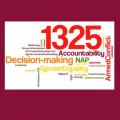
READ WILP’S STATEMENT: On the U.S. National Action Plan (NAP) on Women, Peace and Security here (webpage) or here (pdf).
Download WILPF’s Fact Sheet: On UN SCR1325, the U.S. NAP and WILPF’s Civil Society Consultations here (pdf).
Is it possible for the U.S. National Action Plan on Women, Peace and Security to make a substantive difference in the lives of women around the world, including women living in the US, when over $700 billion of our federal tax dollars are consumed by the military budget and armed interventions annually?
Can the transformative potential of the Women, Peace and Security agenda be fully realized when ‘peace and security’ continue to be understood and acted upon through a framework of militarized security, as opposed to a human security or human rights approach?
Read more about WILPF U.S.'s work on Women, Peace and Security here.
Click here to contact your Representatives NOW! Its time to amplify our voices!
Mission Statement
The mission of Domestic Prisoners of War is to identify and make widely known the pervasive effects of domestic violence and misguided public policies which blame rather than offer healing and social reintegration to survivors. Like the feminist movements for the support of sexual assault survivors and rape law reform in the 1970s and 1980s, we seek to raise consciousness through branch action on the need to reform state laws which often add insult to the physical and psychological injury of domestic abuse.
Through our work, we strive to raise awareness of the economic and social costs of domestic violence in USA society, and of misguided laws that often impoverish survivors by inflicting on them legal disabilities and in turn impoverish society at large by raising barriers to their realizing their potential and making their full contributions to society. Additionally, these costs include overwhelming demands on our first responders. Everyone is affected by the victimization and subjugation of others behind closed doors, and as peace activists of WILPF we affirm that true peace begins at home.
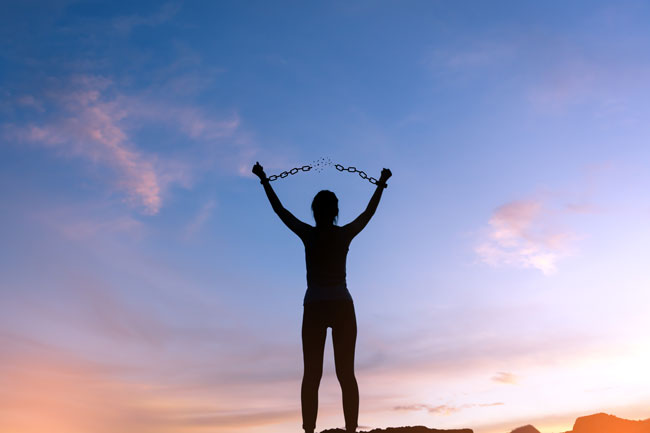
Our Vision
When our physical and mental autonomy is respected and society meets domestic violence with restorative and reparative justice for survivors, there are no limits to what each and every citizen is capable of achieving. When our physical and mental autonomy is violently invaded or violated, civil society will have measures in place for the restoration of the health of these survivors. Our vision is to work for survivor-centered reparative justice, as opposed to victim-blaming patriarchal laws -- as existed in the area of sexual assault not so many decades ago.
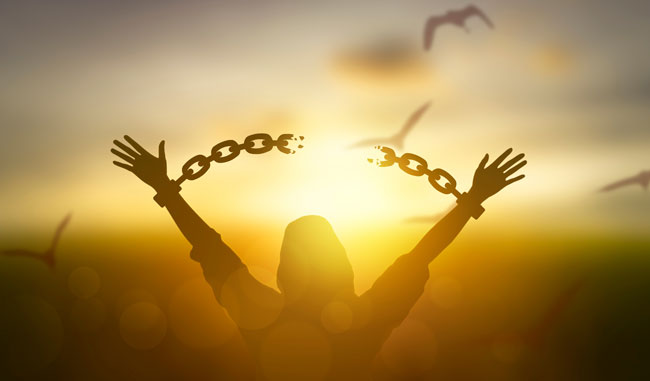
Background
DPOW grew out of comparisons of survival experiences of contributing members as well as the comparing of the domestic violence experiences reported by others. Domestic violence is intersectional and touches on various dimensions of oppression — intimate partner violence, elder abuse, child abuse, and abuse within the LGBT community -- with many effects. People who have experienced shock and trauma, when their love and trust are violated through such violence, not infrequently feel residual effects. Those effects impact their work experiences, families, and other areas -- impacts too often aggravated, not alleviated or healed, by the new trauma of encounters with the legal system. However, this hidden violence of trauma effects and legal-system harms is an area that is rarely openly discussed, leading to domestic violence being seen as merely "a personal issue.”
The National Coalition Against Domestic Violence estimates that 1 of 4 women and 1 out of 7 men is directly affected by domestic violence. Thus it is a high priority for a women's peace organization addressing the needs of its members.
Contact
It is your work that will effect the legislative and other change we wish to see. While DPoW consists mostly of survivors of domestic abuse, such experience is not required for membership in the committee. What is important is a shared recognition that survivors are the ultimate experts on relevant issues. All constructive participation is welcome and appreciated.
For more information on the committee and how to support our efforts or to join, please contact the committee founder and current chair, Deanna Murphy, at: nomoreDPoWs@wilpfus.org
Projects
- At present, members of DPoW are examining the societal and economic costs of Domestic Violence to society. We are collaborating with other organizations in order to recommend research-based changes to Federal and State laws regarding the impacts of Domestic Violence. Our goal is to work with other WILPF Branches on state levels.
- Every year in October, DPoW presents a conference designed to educate, inform, and recruit allies towards it’s mission. At present, members are continuing research in their chosen areas of interest for presentation.
- DPoW members choose demographics of society as an area of personal or professional interest. If a chosen area of interest is already being explored, we invite those who would like to join our work to join up with the members who are exploring your chosen topic area. If a chosen area of interest is not being explored, we welcome your initiation of this work and will work as a committee to see that you are supported in this area.
Resources for information/education
- US Department of Health and Human Services directory of resources
- Survived and Punished (survivor advocacy organization)
- National Coalition Against Domestic Violence
- To further inform oneself or others about the challenges that survivors and protectors face in the judicial system, DPoW recommends viewing the documentary “Children of the Underground” (available through most streaming services). It has directly relevant information to the issues that some are still facing while trying to protect their children from abuse.
WILPF US’s Local to Global and Practicum in Advocacy Programs at the Annual CSW
Through International WILPF's consultative status with the UN Economic and Social Council (ECOSOC) WILPF US has the ability to attend the annual Commission on the Status of Women (CSW). WILPF US offers week-long programs for two different groups during the March CSW meetings, designed to deepen understanding of the work of the CSW, the UN, and WILPF.
One of these programs, Local to Global, is restricted to active WILPF US members. The other program, the Practicum in Advocacy, is for college and university students. Both of WILPF’s CSW programs offer participants an informed orientation to and ongoing briefings about the CSW activities. This background assists participants to better experience the presentations, events, and discussions of the CSW and its work towards UN action on women's rights and issues. Please see below for application requirements, costs, and additional information on each of the two distinct programs.
Priority Themes
From March 10 to 21, 2025, the UN Commission on the Status of Women will hold its 69th session with the priority theme, which will be on the review and appraisal of the implementation of the Beijing Declaration and Platform for Action and the outcomes of the 23rd special session of the General Assembly.
Practicum in Advocacy
WILPF US, along with WILPF women from our International WILPF sections around the world, participates annually in the Commission on the Status of Women. In an effort to open opportunities for students and other somewhat younger individuals, each year WILPF US selects a group of individuals from around the country to participate in the Practicum in Advocacy (Practicum) at the UN Commission on the Status of Women.
Participants may be students enrolled in US universities and colleges. Additionally, this year the program has been opened up to other somewhat younger applicants whose work or community involvement would benefit from them learning more about feminist peace-building processes. These applicants may be working in non-profits or be community leaders or activists.
As part of the Practicum, participants experience the discussions and processes towards UN decisions on women's rights/issues through both formal and informal meetings that take place during the first week of the Commission on the Status of Women. The Practicum will provide ample opportunities for peer-to-peer learning and exploration of opportunities in international relations and advocacy work. During the week participants will attend official high-level UN meetings, panel discussions and other events hosted by member governments and national and international NGOs, as well as parallel events hosted by civil society organizations.
Participants will come away from the week with increased understanding of:
- The structures and functions of the UN and its various parts
- WILPF US and international WILPF’s focuses, programs and activities
- International women’s issues and policy advocacy around these issues
Application Process
Click here for the application for CSW69 2025 and here for the recommendation form (Non-students should adapt the form to their employment or community situation.).
The deadline for both applications and letters of recommendation is January 8 2025 at 11:59 PM PST.
Frequently Asked Questions
Who is eligible to participate?
The WILPF UN Practicum in Advocacy is open to somewhat younger individuals currently enrolled as undergraduate, graduate and doctoral students in the United States, as well as younger community leaders or activist and others working in non-profits addressing peace and justice issues.
How much does the Practicum cost?
The tuition for the Practicum in Advocacy is expected to be $1,000 + flight and travel expenses. Tuition covers all expenses for the week including hotel, food, UN access and conference fees, as well as in-town travel during the week. It does not include travel to and from NYC.
Limited scholarships are available. applicants interested in scholarships should indicate their need on the application. Applicants must also work with their institution to identify funds available to them. Applicants may contact Practicum coordinators for help in troubleshooting fundraising efforts. Also, those writing recommendations are expected to help applicants identify funding available through educational and other institutions and/or other possible funding.
How do I make payments for the Practicum in Advocacy?
There are two ways to send payments for the practicum. Students or their donors can pay by credit card online here. Or one can pay by check payable to WILPF US and mailed to the WILPF US office. Write "practicum" and the student's name in the memo line.
WILPF US
Friends House
P.O. Box 13075
Des Moines, IA 50310
When is the UN Practicum in Advocacy?
The WILPF program starts Saturday and goes March 8-15. The UN Practicum in Advocacy participates in the first week of the CSW meetings, which run from March 10 to 21, 2025.
WILPF Practicum in Advocacy participants are required to attend the entire seven-day WILPF program and must arrive at our hotel in NYC by 10:30 am Saturday, March 8, so we can leave to secure our UN badges at that time. Saturday evening, there is an orientation to the Practicum and WILPF’s work. Sunday we will participate in Consultation Day, an orientation to the CSW. The proceedings of the CSW start Monday, March 10, 2025.
Will I receive school credit for the UN Practicum in Advocacy?
WILPF does not offer course credit for the Practicum, but students may be able to arrange course credit, for example, through an independent study, from their home college or university. Practicum coordinators are available to help students individually on arranging for course credit where this is possible. However, it might not be possible to arrange for course credit, due to differing rules from institution to institution.
What are the requirements for the UN Practicum in Advocacy?
All applicants will be required to complete a post-Practicum project. Assistance and information will be given to students throughout the week including one-on-one mentoring with program faculty and coordinators as well as introductions to WILPF US leadership. Contact us for further information about the post-Practicum project.
What is the daily schedule for the Practicum?
The agenda for the week is jam-packed. Every day, time is split among Practicum delegation meetings, speakers, presentations by women activists from many countries, and evening debriefings.
Most mornings, participants will be expected to join in early morning briefings. They will attend meetings and other events from 8:00 – 5:00 and, unless other scheduling arises, have daily debriefing sessions 6:30 – 8:30 pm.
Practicum Faculty and Coordinators will make few exceptions for missing delegation activities.
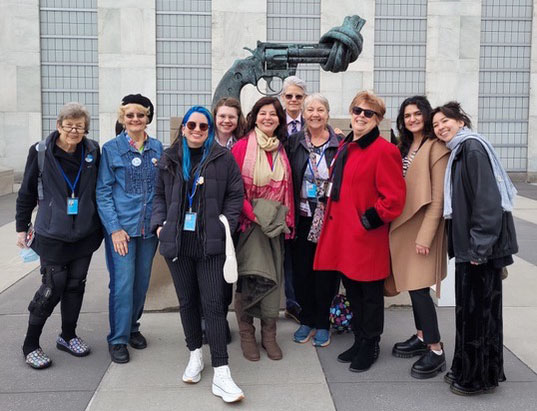
Local to Global
The Local to Global program was created to help open opportunities for active and seasoned members to bring local voices into the national and international work of WILPF. Additionally, Local to Global was created to foster intergenerational mentorship and relationship-building between members of WILPF US and those just becoming involved with WILPF US via the Practicum in Advocacy Program.
Take 13+ minutes to hear from our Local to Global Coordinator and Participants from CSW 68 (2024). Consider how you might use this experience to help us move toward what Jane Addams describes as true peace: “True peace is not merely the absence of war, it is the presence of justice.” Click here for descriptions, perspectives, and impressions.
Application Process
Interested WILPF US members must submit an application and a letter of reference and recommendation from a WILPF member familiar with the applicant’s WILPF work (using the form below).
Direct your reference contact to this website to access and complete the reference and recommendation form.
CSW 69 is Saturday, January 11, and the deadline for the letter recommendation is Monday, January 13.
Click here for application form.
Click here for recommendation form.
Frequently Asked Questions
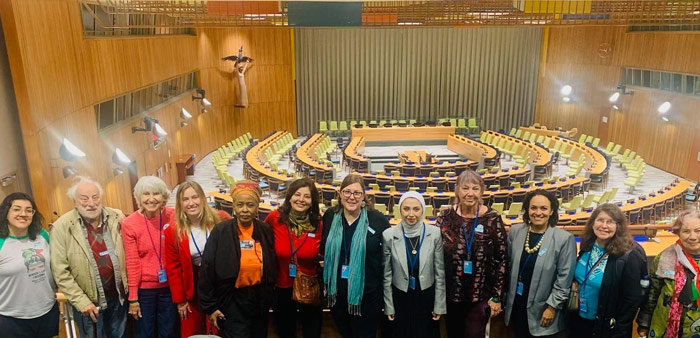
When is the Local to Global program?
The Local to Global program takes place during the first week of the meetings of the UN Commission on the Status of Women. This year our CSW program dates are Sunday, March 10 through Friday, March 14. Local to Global participants are required to attend the entire week and should plan to arrive at the hotel in New York City by Sunday morning, March 10. If possible, we’ll secure our UN badges and attend an orientation session conducted by WILPF US CSW Program Coordinators and others. If travel plans allow, we’ll participate in the special CSW remote session referred to as Consultation Day on Sunday from our hotel rooms, gathering for a discussion following. The in-person conference begins Monday, March 10.
Who is eligible to participate?
Local to Global participants are required to be WILPF members in good standing and be active in their local branch and/or active in a national issue or standing committee. Applicants must submit a letter of reference from a current WILPF US member who has been a member for at least two years.
How much does Local to Global participation cost?
There is no tuition requirement for the Local to Global program as it was designed to open WILPF’s work at the UN to active WILPF members who otherwise might not be able to afford the trip and related conference fees. WILPF US will pay for hotel, most meals, and all UN conference fees. However, participants must arrange their own travel to and from NYC for the week of the meetings and fund about half of that travel expense (consistent with WILPF US guidelines for reasonable travel costs; further details upon approved application).
What are the expectations for Local to Global participants?
Participants are encouraged to mentor Practicum participants during the week and to learn from each other as well. Program Coordinators aim to establish an environment where information and expertise is readily exchanged across all our differences. Local to Global participants will also prepare for and facilitate a morning briefing session during the week, on their work with WILPF US and will help Practicum participants learn ways to contribute to WILPF’s work beyond the CSW week.
Additionally, after you return from the CSW meetings, L2G participants are required to complete a project of their own design – generally, a public presentation, related to the CSW programs, and, where possible, linked to WILPF projects near you. You will discuss the parameters of this project with our program faculty before and after the CSW. Our faculty will help advise you on how to design and carry out your project.
What is the daily schedule for the delegation?
The agenda for the week is jam-packed. Delegation participants will attend briefings most mornings and CSW meetings from 8:00 am–5:00 pm. There will also be evening debriefing sessions with the Practicum participants throughout the week.
Questions?
For the Practicum, contact Shilpa Pandey at UN-Practicum-mail@wilpfus.org
For Local to Global, contact Jan Corderman at UN-L2G-mail@wilpfus.org
The working language of the WILPF US UN Programs is English.



